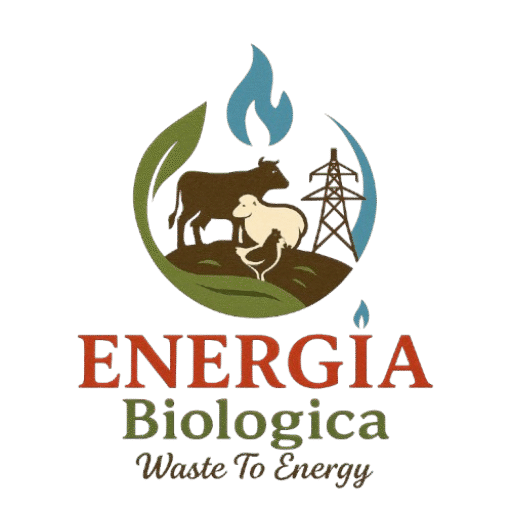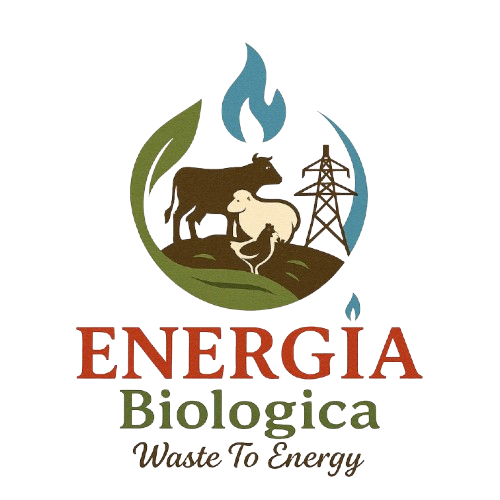Mapping Nigeria’s Biogas Hotspots: Strategic Locations and Feedstock Sources
Nigeria, a nation characterized by its vibrant agricultural sector and burgeoning urban centres, grapples with two interconnected challenges: the imperative for enhanced energy security and the escalating issue of organic waste management. Millions of tons of agricultural residues, livestock waste, and municipal organic waste are generated annually, often without adequate processing or disposal, leading to environmental pollution and lost economic opportunities.1 Yet, within this challenge lies a profound opportunity: the strategic conversion of these abundant organic resources into clean energy and valuable biofertilizer through biogas technology. This article maps out Nigeria’s prime biogas hotspots, highlighting key regions and their unique feedstock potential, and underscores how this can significantly address Nigeria’s energy access challenges, particularly in rural electrification.
Energia Biologica Limited, Nigeria’s pioneering biogas industry facilitator, is at the forefront of this transformative journey. We adopt a partnership-driven, integrative approach, bringing together finance, technology, construction, and operations partners to develop bankable biogas projects. Our mission is to catalyse sustainable biogas development in Nigeria, turning waste into wealth and empowering communities with reliable, locally generated clean energy.
The Biogas Hotspots: A Regional Overview
Nigeria’s diverse agro-ecological zones and population distribution create distinct opportunities for biogas development. Energia Biologica focuses its efforts on strategic locations characterized by high concentrations of organic feedstock, ensuring project viability and maximum impact.
- Southwest Nigeria: Agricultural Hubs and Urban Density (Ogun, Oyo, Osun)
The Southwest region, encompassing states like Ogun, Oyo, and Osun, presents a compelling landscape for biogas development. These states are highly populated and feature significant agricultural activities, making them ideal biogas Nigeria hotspots.
- Ogun State: Known for its industrial clusters and proximity to Lagos, Ogun State generates substantial industrial organic waste, coupled with significant poultry and livestock farming.2 Places like Abeokuta, Sagamu, and Ota are urban centres with considerable municipal organic waste generation, while rural areas offer access to agricultural residues.
- Oyo State: As a major agricultural producer, Oyo State, particularly around Ibadan, boasts large cattle markets and abundant crop residues, including sugarcane bagasse. A study even highlights the potential of sugarcane bagasse in Oyo State for biogas production, with co-digestion with cow manure showing promising results.3
- Osun State: Similar to its neighbours, Osun State contributes significantly to agricultural output, providing a consistent supply of various crop residues and livestock manure. The density of human and animal populations in these states ensures a steady, concentrated supply of diverse feedstock, enabling efficient waste collection and processing for biogas plants.
The combination of urban waste streams and extensive agricultural activity makes the Southwest a critical area for developing integrated biogas solutions.
- Northwest Nigeria: Livestock Richness (Kano, Kaduna)
The Northwest geopolitical zone, particularly Kano and Kaduna states, is a powerhouse for livestock production, making it a primary target for manure-based biogas projects.
- Kano State: Home to one of the largest cattle markets in West Africa, Kano generates immense quantities of cow dung daily. Abattoirs in Kano City also contribute significant organic waste.4 This concentration of livestock waste offers a high-potential source for large-scale biogas production, addressing both energy needs and critical waste management challenges in these bustling urban and semi-urban environments.
- Kaduna State: With a substantial livestock population and significant agricultural land, Kaduna State presents similar opportunities. Studies indicate the potential for converting municipal solid waste (MSW) in Kaduna State to biomethane, highlighting the diverse feedstock opportunities beyond just animal waste.5
The sheer volume of animal waste in these states positions them as strategic locations for major biogas plants Nigeria, which can provide reliable energy for surrounding communities and industrial operations.
- North Central Nigeria: Diverse Agriculture and Emerging Potential (Kwara)
Kwara State, in the North Central region, stands out with its mixed agricultural landscape, offering varied feedstock sources for biogas.
- Kwara State: Known for its cultivation of major crops like maize, sorghum, and cassava, Kwara produces abundant agricultural residues. Additionally, the presence of significant livestock farming contributes to available manure. Research has highlighted Kwara State’s potential for biogas production from both animal manure and crop residues, aligning with efforts to diversify energy sources and improve waste management practices in the region. The Department of Agricultural and Biosystems Engineering, University of Ilorin, has even conducted local research on biogas, organic fertilizer, and biofuel development, underscoring the state’s readiness for such initiatives.
- Northeast Nigeria: Vast Arable Land and Livestock (Adamawa, Taraba, Yobe)
The Northeast, comprising states like Adamawa, Taraba, and Yobe, boasts vast arable land and substantial livestock populations, especially cattle.
- Adamawa, Taraba, and Yobe States: These states are major agricultural producers, generating extensive crop residues such as rice straw, maize cobs, and groundnut shells. They also have significant nomadic pastoralist communities, leading to large amounts of dispersed livestock waste. In Yobe State, for instance, a case study of the Geidam cattle market revealed a potential for generating approximately 4000m3 of biogas weekly from cow dung, underscoring the enormous, often overlooked, energy potential in these regions.
Developing biogas projects in the Northeast can transform widespread agricultural waste into a sustainable energy source, supporting rural development and addressing environmental concerns associated with traditional waste disposal methods.
- South-South Nigeria: Agro-Industrial Byproducts (Delta)
In the South-South, Delta State offers unique feedstock opportunities, particularly from agro-industrial processes.
- Delta State: While known for its oil and gas industry, Delta State also has a significant agricultural base, including extensive palm oil and cassava processing. These activities generate large quantities of organic byproducts like palm oil mill effluent (POME) and cassava peels. Studies show that cassava, yam, and plantain peels are common food wastes in the Niger Delta, with significant biogas potential.6 Leveraging these high-volume industrial and agricultural residues can create substantial clean energy, reducing pollution from unprocessed waste.
Economic Multipliers: Integrated Industrial Parks and Rural Electrification
The strategic mapping of these biogas hotspots goes beyond identifying raw material sources; it’s about maximizing economic and social impact. Energia Biologica champions the development of integrated industrial parks where biogas facilities are co-located with industries and agricultural operations. This model creates powerful economic multipliers:
- Synergistic Waste Management: Industries and farms within the park can channel their organic waste directly to the biogas plant, optimizing logistics and reducing disposal costs.
- Reliable Clean Energy: The biogas generated can supply reliable, affordable electricity and heat directly to co-located businesses, reducing their operational costs and reliance on the unreliable national grid or expensive fossil fuels. This significantly contributes to energy independence Nigeria.
- Biofertilizer for Agriculture: The digestate byproduct can be utilized by agricultural businesses within or near the park, improving soil fertility and reducing the need for imported chemical fertilizers.
- Job Creation: The construction and operation of biogas plants, along with associated industries in the park, create new jobs and stimulate local economies.7
Furthermore, these strategically located biogas projects are pivotal in addressing Nigeria’s persistent energy access challenges, particularly in rural electrification. By deploying modular-sized biogas plants in these feedstock-rich areas, we can provide off-grid electricity to communities that have long been without reliable power. This empowers households, supports small businesses, improves healthcare facilities, and enhances educational opportunities, truly illuminating hope for countless Nigerians, as seen in model projects focusing on rural energy access.
Pioneering the Waste-to-Wealth Transformation
Energia Biologica’s mission to catalyse sustainable biogas development in Nigeria is rooted in a deep understanding of these regional potentials and the transformative power of a partnership-driven approach. We act as facilitators of waste-to-wealth transformation, aligning with global sustainability goals and unlocking the immense value trapped in organic waste. Our expertise in bringing together finance, technology, and operational excellence ensures that these projects are not only environmentally beneficial but also economically viable and sustainable in the long term.
The abundant organic waste across Nigeria’s diverse landscapes is not merely a problem to be managed but a golden opportunity to be harnessed. From the livestock-rich plains of the Northwest to the agricultural heartlands of the Southwest and the agro-industrial zones of the South-South, each region holds unique promise for biogas technology to deliver sustainable energy solutions.
Join Energia Biologica in realizing this vision for a greener, more prosperous Nigeria.
Explore partnership opportunities with Energia Biologica to develop bankable biogas projects across Nigeria’s high-potential locations.
Together, we can convert Nigeria’s waste into a sustainable source of energy, economic growth, and a brighter future.

